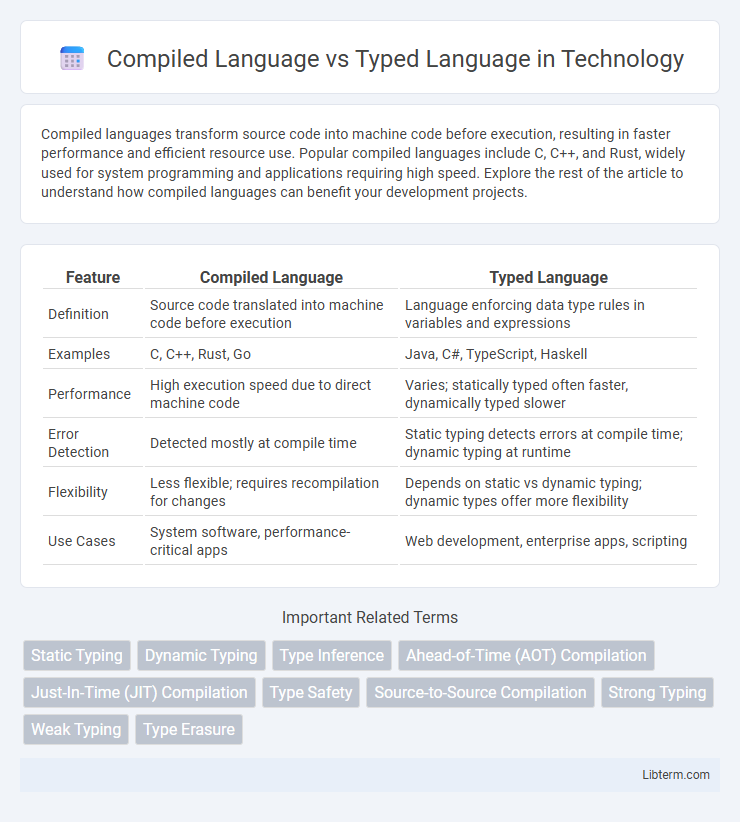Compiled languages transform source code into machine code before execution, resulting in faster performance and efficient resource use. Popular compiled languages include C, C++, and Rust, widely used for system programming and applications requiring high speed. Explore the rest of the article to understand how compiled languages can benefit your development projects.
Table of Comparison
| Feature | Compiled Language | Typed Language |
|---|---|---|
| Definition | Source code translated into machine code before execution | Language enforcing data type rules in variables and expressions |
| Examples | C, C++, Rust, Go | Java, C#, TypeScript, Haskell |
| Performance | High execution speed due to direct machine code | Varies; statically typed often faster, dynamically typed slower |
| Error Detection | Detected mostly at compile time | Static typing detects errors at compile time; dynamic typing at runtime |
| Flexibility | Less flexible; requires recompilation for changes | Depends on static vs dynamic typing; dynamic types offer more flexibility |
| Use Cases | System software, performance-critical apps | Web development, enterprise apps, scripting |
Introduction to Compiled and Typed Languages
Compiled languages translate source code into machine code before execution, enhancing runtime performance by enabling direct hardware interaction. Typed languages enforce variable data types either at compile-time (statically typed) or run-time (dynamically typed), improving code reliability and error detection. Understanding the compilation process and type systems is crucial for selecting the appropriate programming language for a given application.
Defining Compiled Languages
Compiled languages are programming languages whose source code is transformed into machine code by a compiler before execution, enabling faster runtime performance and direct hardware interaction. Examples include C, C++, and Rust, which emphasize efficiency and resource management through this ahead-of-time compilation process. This contrasts with interpreted languages, where code is executed line-by-line at runtime without prior compilation.
Understanding Typed Languages
Typed languages enforce data type constraints on variables and expressions, ensuring type safety during compilation or runtime, which helps prevent type errors and enhances program reliability. Static typing, a common feature in compiled languages, requires explicit type declarations and allows early error detection and optimization, whereas dynamic typing determines types during execution, offering increased flexibility but potential runtime errors. Understanding typed languages involves recognizing the trade-offs between strict type enforcement for performance and safety versus the versatility of dynamic typing in programming paradigms.
Key Differences Between Compiled and Typed Languages
Compiled languages transform source code into machine code before execution, enhancing performance by enabling direct hardware interaction. Typed languages enforce data type constraints either statically at compile-time or dynamically at runtime, improving code reliability and reducing errors. The key difference lies in compilation affecting how code is executed, while typing governs data integrity and error detection during development.
Compilation Process Explained
Compiled languages transform source code into machine code through a compilation process involving lexical analysis, syntax analysis, semantic analysis, optimization, and code generation, resulting in executable files. Typed languages enforce data type rules during compilation, enabling early detection of type errors and improved code safety. The compilation process in typed languages includes type checking phases that ensure type correctness before generating optimized machine code.
Static vs Dynamic Typing
Compiled languages translate source code into machine code before execution, often supporting static typing where variable types are fixed at compile time, enhancing type safety and performance. Static typing enables early error detection through explicit type declarations, reducing runtime errors and improving code maintainability. In contrast, dynamically typed languages determine variable types at runtime, offering greater flexibility but potentially increasing runtime type errors and slowing performance compared to statically typed compiled languages.
Performance Considerations
Compiled languages such as C++ and Rust translate source code directly into machine code, enabling faster execution and optimized performance by leveraging low-level hardware resources. Typed languages, especially statically typed ones, allow compilers to perform ahead-of-time type checking and optimizations, reducing runtime errors and improving efficiency. Performance considerations in compiled and typed languages largely depend on the degree of type enforcement and compilation strategies, impacting memory management and execution speed.
Error Detection and Debugging
Compiled languages perform error detection during the compilation phase, allowing developers to identify syntax and type errors before runtime, which reduces runtime crashes and improves overall program stability. Typed languages, particularly statically typed ones, enforce type checking at compile time, catching type mismatches early and facilitating easier debugging by preventing invalid operations on data types. In contrast, dynamically typed languages often detect errors at runtime, which may delay debugging but provide more flexibility during development.
Use Cases and Popular Examples
Compiled languages like C and Go are favored in performance-critical applications such as system software, game development, and embedded systems due to their direct machine code translation. Typed languages, including static types like Java and C# or dynamic types like Python and JavaScript, are preferred for large-scale software projects and rapid application development where type safety and flexibility improve code maintainability and reduce runtime errors. Popular compiled and statically typed languages such as Rust excel in memory safety for system-level programming, while dynamically typed languages like Ruby are widely used in web development for their developer-friendly syntax and fast prototyping.
Choosing the Right Language for Your Project
Choosing the right language for your project depends on performance needs and error detection efficiency, where compiled languages like C++ offer faster execution through direct machine code translation. Typed languages, including statically typed ones like Java or dynamically typed ones like Python, enhance code reliability and maintainability by enforcing variable type constraints at compile-time or runtime. Balancing factors such as development speed, application complexity, and debugging capabilities ensures optimal language selection for specific project requirements.
Compiled Language Infographic

 libterm.com
libterm.com